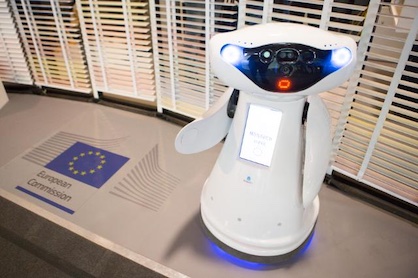#Europe
Commission launches AI innovation package to support Artificial Intelligence startups and SMEs
In her 2023 State of the Union address, President von der Leyen announced a new initiative to make Europe's supercomputers available to innovative European AI startups to train their trustworthy AI models. As a first step, the Commission launched in November 2023 the Large AI Grand Challenge, a prize giving AI startups financial support and supercomputing access. Today's package puts this commitment into practice through a broad range of measures to support AI startups and innovation, including a proposal to provide privileged access to supercomputers to AI startups and the broader innovation community. It contains:
An amendment of the EuroHPC Regulation to set up AI Factories, a new pillar for the EU's supercomputers Joint Undertaking activities. This includes:
Acquiring, upgrading and operating AI-dedicated supercomputers to enable fast machine learning and training of large General Purpose AI (GPAI) models;
Facilitating access to the AI dedicated supercomputers, contributing to the widening of the use of AI to a large number of public and private users, including startups and SMEs;
Offering a one-stop shop for startups and innovators, supporting the AI startup and research ecosystem in algorithmic development, testing evaluation and validation of large-scale AI models, providing supercomputer-friendly programming facilities and other AI enabling services;
Enabling the development of a variety of emerging AI applications based on General Purpose AI models.
A decision to establish an AI Office within the Commission, which will ensure the development and coordination of AI policy at European level, as well as supervise the implementation and enforcement of the forthcoming AI Act.
An EU AI Start-Up and Innovation Communication outlining additional key activities:
Financial support from the Commission through Horizon Europe and the Digital Europe programme dedicated to generative AI. This package will generate an additional overall public and private investment of around €4 billion until 2027;
Accompanying initiatives to strengthen EU's generative AI talent pool through education, training, skilling and reskilling activities;
Further encourage public and private investments in AI start-ups and scale-ups, including through venture capital or equity support (including via new initiatives of the EIC accelerator Programme and InvestEU);
The acceleration of the development and deployment of Common European Data Spaces, made available to the AI community, for whom data is a key resource to train and improve their models. A new Staff Working Document on common European data spaces has also been published today, providing the latest state of play;
The ‘GenAI4EU' initiative, which aims to support the development of novel use cases and emerging applications in Europe's 14 industrial ecosystems, as well as the public sector. Application areas include robotics, health, biotech, manufacturing, mobility, climate and virtual worlds.
The Commission is also establishing, with a number of Member States, two European Digital Infrastructure Consortiums (EDICs):
The ‘Alliance for Language Technologies' (ALT-EDIC) aims to develop a common European infrastructure in language technologies to address the shortage of European languages data for the training of AI solutions, as well as to uphold Europe's linguistic diversity and cultural richness. This will support the development of European large language models.
The ‘CitiVERSE' EDIC will apply state-of-the-art AI-tools to develop and enhance Local Digital Twins for Smart Communities, helping cities simulate and optimise processes, from traffic management to waste management.

AI@EC Communication
The Commission also adopted today a Communication outlining the Commission's own strategic approach to the use of Artificial Intelligence. With this strategic vision, the Commission anticipates and prepares internally for the implementation of the EU AI Act. It includes concrete actions about how the Commission will build institutional and operational capacity to ensure the development and use of trustworthy, safe and ethical AI. The Commission is also preparing to support EU public administrations in their own adoption and use of Artificial Intelligence.
Next Steps
The European Parliament and the Council will now consider the Commission's proposed amendments on the Regulation establishing the European High Performance Computing Joint Undertaking.
The AI Office will be established within the Commission. The AI Office will implement the future AI Act at EU level and will supervise the rules for general-purpose AI models and systems. It should become a central coordination body for AI policy at EU level and cooperate with other Commission departments, EU bodies, Member States and the stakeholder community. It will have an international vocation and promote the EU approach to AI governance and contribute to the EU's international activities on AI. More generally, the AI Office should build up knowledge and understanding on AI and foster AI uptake and innovation. The decision to establish the AI Office enters into force on 24 January, with operations commencing in the following months.
Member States will now establish the European Digital Infrastructure Consortiums ALT-EDIC and the CitiVERSE EDIC with the support of the Commission.
Background
For years, the Commission has been facilitating and enhancing cooperation on AI across the EU to boost its competitiveness and ensure trust based on EU values. The Commission's White Paper on AI, published in 2020, set out a clear vision for AI in Europe: an ecosystem of excellence and trust. In April 2021, the Commission proposed the EU AI Act and a new Coordinated Plan with Member States, to guarantee the safety and fundamental rights of people and businesses, while strengthening investment and innovation across EU countries. The EU AI Act was provisionally agreed by co-legislators in December 2023 and is the world's first comprehensive law on Artificial Intelligence.
Margrethe Vestager, Executive Vice-President for a Europe Fit for the Digital Age, comments: "You need computing power to develop AI. A lot of it. So we want to give SMEs and start-ups privileged access to the network of European supercomputers. We are committed to innovation of AI and innovation with AI. And we will do our best to build a thriving AI ecosystem in Europe."
And Thierry Breton, Commissioner for Internal Market, said: "Today, we announce the launch of AI Factories, bringing together the ‘raw materials’ for AI: computing power, data, algorithms and talent. They will serve as a one-stop shop for Europe’s AI start-ups, enabling them to develop the most advanced AI models and industrial applications. We are making Europe the best place in the world for trustworthy AI."
















